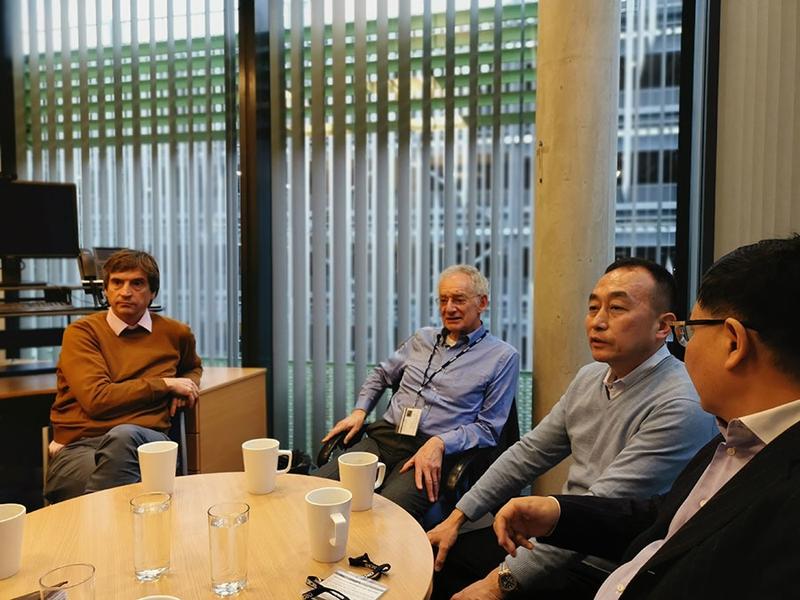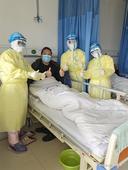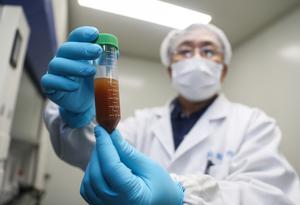 In this undated photo, the World Laureates Association Shanghai Center research team discusses the novel coronavirus outbreak with Gavin Swinton (first from left), head of the Medical Sciences Division at the University of Oxford, and Raymond Dwek (second from left), the director of the Oxford Glycobiology Institute, at the university in late January, 2020. (PHOTO PROVIDED TO CHINADAILY.COM.CN)
In this undated photo, the World Laureates Association Shanghai Center research team discusses the novel coronavirus outbreak with Gavin Swinton (first from left), head of the Medical Sciences Division at the University of Oxford, and Raymond Dwek (second from left), the director of the Oxford Glycobiology Institute, at the university in late January, 2020. (PHOTO PROVIDED TO CHINADAILY.COM.CN)
When fighting a new viral outbreak, scientists often spend months determining the microorganism's pathogenesis before developing a targeted drug or vaccine. But as the novel coronavirus rampages through China, time is of the essence and researchers around the world are joining forces to find a speedy cure.
While there is not yet an effective medication or vaccine for the virus, scientists from the US, the UK, China and elsewhere are making substantial progress and many existing drugs are being tested in clinical trials for potency against the novel coronavirus
While there is not yet an effective medication or vaccine for the virus, scientists from the United States, the United Kingdom, China and elsewhere are making substantial progress and many existing drugs are being tested in clinical trials for potency against the novel coronavirus.
READ MORE: Official: Anti-novel coronavirus drug under clinical trial
The World Laureates Association Shanghai Center said it has gathered an all-star team of experts, including Nobel laureates in chemistry Roger Kornberg and Michael Levitt, noted antibody expert Richard Lerner and biologist Raymond Dewk, to help investigate the virus and propose new solutions.
"They're willing to actively exert international scientific talent to support China in combating the epidemic," the center said in a statement on Monday.
Promising drugs
There are two typical ways of treating a viral infection. One is using small-molecule drugs that can stop the virus from replicating by interfering with its proteins. The other way is to use antibodies that bind to the virus and cause it to self-destruct, according to the World Health Organization.
Zhong Nanshan, one of the leading experts tackling the outbreak in China, told Xinhua News Agency on Sunday that there are at least seven existing small-molecule drugs going through various stages of clinical trials in China.
 Members of a military medical team pose for a photo with a patient diagnosed with novel coronavirus (2019-nCoV) pneumonia in Wuhan, Central China's Hubei province, Jan, 29, 2020. (PHOTO / XINHUA)
Members of a military medical team pose for a photo with a patient diagnosed with novel coronavirus (2019-nCoV) pneumonia in Wuhan, Central China's Hubei province, Jan, 29, 2020. (PHOTO / XINHUA)
On Sunday, Beijing's China-Japan Friendship Hospital announced it will begin clinical trials on 270 mildly and moderately ill patients infected with the novel coronavirus in the epicenter of the outbreak in Central China using an experimental drug from the US called remdesivir, which was originally developed as an Ebola cure.
China's Center for Drug Evaluation of the National Medical Products Administration approved the trials on Sunday to be carried out in Wuhan, Hubei province, from Monday to April 27, its official website said.
The drug is developed by US biotech company Gilead Sciences. It was provided on compassionate grounds to a 35-year-old man in the US infected with the novel coronavirus, and his symptoms noticeably improved within a day with no obvious side effects, according to a paper published in the New England Journal of Medicine last week.
The US drugmaker said in an online statement last week that it is working closely with health authorities in China and around the world to respond to the novel coronavirus outbreak.
However, it stressed that remdesivir has "not yet been licensed or approved anywhere globally and has not been demonstrated to be safe or effective".
While there is no data regarding remdesivir's effectiveness against the novel coronavirus, the drug has demonstrated antiviral capability in animal models against viral pathogens like SARS and MERS — fellow coronaviruses that are structurally similar to the one from Wuhan, the company said.
ALSO READ: 8 key questions about new coronavirus
Qian Jiahua, chief scientist at the drug evaluation center, told Chinese science news outlet Intellectual that the clinical trial period in China can be shortened if remdesivir produces the same impressive results seen in multiple test patients.
"I hope the drug is like penicillin and can have an immediate impact on a disease," Qian said. While Qian lauded the joint effort, he highlighted the fact that the drug is not yet registered in China and Chinese scientists don't know much about its clinical test results done in the US.
"I think we should move with caution before mass administrating it to a demographic as diverse and complex as the Chinese people," he said.
Zeng Weigen, a doctor at Beijing Chaoyang Hospital, said remdesivir has proved to be effective on one US patient with symptoms of pneumonia, but it will require more clinical trials to confirm its potency against the novel coronavirus.
"In terms of safety, this drug has been thoroughly tested on humans, mainly on Ebola patients, and its side effects are not that pronounced," Zeng said.
"We hope it can have a good inhibiting effect on the virus and save our Chinese patients. We're looking forward to more data from clinical trials," he added.
Apart from remdesivir, scientists are also testing a cocktail of flu and HIV drugs that had showed potential in curbing the coronavirus. Thailand's Ministry of Health said on Sunday that Thai doctors have seen apparent success treating a 71-year-old woman infected with the novel coronavirus.
The doctors used a combination of the flu drug oseltamivir with lopinavir and ritonavir — antivirals used to treat HIV. The patient's health significantly improved and she tested negative for the virus 48 hours after Thai doctors administered the combination.
However, doctors are still monitoring the patient and waiting for scientists to prove their findings. Hospitals in Beijing have reportedly been using the same HIV drugs as part of treatment for the novel coronavirus, though it is unclear if they have been successful.
Zhang Dingyu, president of Wuhan Jinyintan Hospital, said at a news briefing on Sunday that HIV drugs like lopinavir have kept severely ill patients at his hospital from worsening.
However, Zhang said such drugs have some serious side effects including diarrhea, allergic reactions, liver damage and slowed heart rates, and must be taken under close supervision and guidance.
 A health researcher shows a program, newly launched by Shanghai East Hospital of Tongji University and Stermirna Therapeutics Co, to develop an mRNA vaccine targeting the novel coronavirus, in Shanghai, Jan 29, 2020. (PHOTO / XINHUA)
A health researcher shows a program, newly launched by Shanghai East Hospital of Tongji University and Stermirna Therapeutics Co, to develop an mRNA vaccine targeting the novel coronavirus, in Shanghai, Jan 29, 2020. (PHOTO / XINHUA)
New treatments
Since the outbreak, the National Institutes of Health in the US along with around a dozen US biotech companies, have announced vaccine or drug development initiatives for the novel coronavirus. But a majority of are still in preclinical stages.
Mark Denison, a virologist at Vanderbilt University in Nashville, Tennessee, told the journal Science that remdesivir has to be administered early in order to have significant impact on the disease.
An ideal treatment would be to combine drugs like remdesivir and monoclonal antibodies, he said. Monoclonal antibodies are lab-made molecules that can mimic a person's immune system to accurately attack pathogens, such as cancer cells.
ALSO READ: Li urges vaccine, medicine development against epidemic
US biotech companies such as Regeneron Pharmaceuticals and Vir Biotechnology have announced they are creating such antibodies to target the novel coronavirus, but it will likely take months before they can carry out clinical trials.
Chinese and US researchers are also working together to develop a vaccine against the virus, which included experts from Baylor College of Medicine in Houston, the University of Texas, and Shanghai's Fudan University.
Song Zhiheng, deputy director of Zhejiang province's Science and Technology Department, said scientists have isolated 10 viral strains that can be used to create vaccines.
A conventional vaccine consists of an inactivated virus or its protein that can be injected into the body to train the immune system to recognize the pathogen and produce antibodies against it in case of encountering the real virus in the future.
Last week, the Eighth People's Hospital in Guangzhou, Guangdong province, said they have produced a drug called pneumonia-I that can significantly reduce symptoms of patients with mild cases of the novel coronavirus.
The hospital said the drug had successfully lowered fevers in all 50 patients, with no cases of their illnesses intensifying. After a week of clinical observations, around 50 percent reported no coughing and sore throats, and nearly 70 percent no longer experienced fatigue.
The drug is currently awaiting registration and approval, the local medical product authority said. Once approved, it can be quickly manufactured by local pharmaceutical companies to meet local patients' needs.
Lu Shan, a medical professor at the University of Massachusetts, told China News Weekly that SARS and the novel coronavirus shared many similarities, and by building on previous vaccine research on SARS, vaccine development for the new virus should see some progress soon.
"We don't have any technical difficulties producing a vaccine, but we need time to test it on animals and ensure safety," he said.


